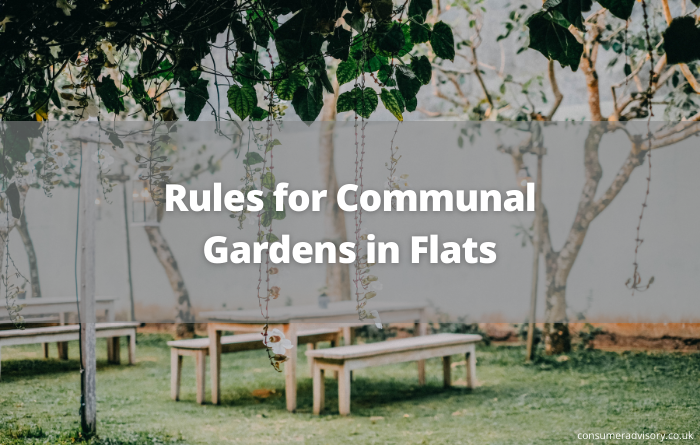The rules for communal gardens in flats are generally decided by the tenants and the landlord. A board may exist made up of these people where the rules are agreed upon. Difficulties may arise if new people enter the building who were not aware of these rules or when and how they were agreed which has the potential to cause conflict.
Rules for a communal garden
If you are not sure about the rules in your garden then you should ask your landlord for clarification. If you find that a neighbour or other member of the building objects to the way you behave in the garden then seek clarification from the board or the landlord.
Lease or tenancy agreement
If you think a neighbour is causing an issue instead, then again, you should consult the rules that were put in place by either the board or landlord. Your tenant agreement may well contain this information.
Garden etiquette
There are many benefits to having a shared garden in a block of flats. It can provide a shared space for socialising, add value to properties and create a sense of community spirit.
However, there are also some rules that should be followed in order to ensure that everyone can enjoy the garden.
First, all residents should respect the noise levels and not play loud music or disturb other residents.
Secondly, smoking is not allowed in the garden if others object to it.
Thirdly, all residents must take responsibility to keep the garden clean and tidy.
Fourthly, children should be supervised at all times.
Finally, pets are only allowed in the garden if they are on a lead and under control. By following these simple rules, everyone can enjoy the garden without causing disruption.
Planting in the garden
Any green-fingered individual will tell you that one of the most important aspects of gardening is keeping on top of the tidying up. It can be all too easy for things to get out of control, and before you know it you’re facing an impossible task.
The absolute golden rule is to stay on top of it from the very beginning.
This means controlling aggressive plants, imposing rules about what can be planted where, and generally keeping a close eye on the outdoor space. From a legal perspective, it’s also important to be aware of your responsibilities.
If you live in a flat, for instance, you may be responsible for communal spaces as well as your own garden. And if your neighbour’s Claim damages because your untidy garden is affecting the look and feel of their property then you may be liable.
It’s best to avoid any potential disputes by being sensible with your planting and tidying up, and following any rules that have been put in place by your landlord or board.
Get to know your neighbours
There are many benefits to getting to know your neighbours. One of the most obvious benefits is that you have someone to rely on in times of need. If you need help with moving, carrying shopping or taking out the rubbish, your neighbours are there to lend a hand.
Another big benefit of knowing your neighbours is that you build a sense of community. When everyone knows each other, they are more likely to look out for one another and help out in times of need.
A great way to get to know your neighbours is by using the garden in your building. This is a great opportunity to get to know your neighbours and build relationships with them.
The garden is also a great place to relax in the sun or have a picnic on a warm day. With summer just around the corner, now is the perfect time to start getting to know your neighbours and make use of the communal garden.
Why you need garden rules
Living in close quarters with people you do not know can be a challenge. One way to help defuse tension is to establish some ground rules.
For example, you might agree to respect each other’s privacy, keep the noise level down after a certain hour, or take turns using shared spaces.
By setting clear expectations, you can help to prevent misunderstandings and reduce tension.
Another way to defuse tension is to make an effort to get to know your neighbours and see them as potential friends. If you take the time to learn about their interests, hobbies, and backgrounds, it will be easier to find common ground and build a rapport.
Finally, don’t hesitate to reach out if you’re feeling overwhelmed or stressed. A simple conversation can go a long way toward diffusing tension.
What to do if you fall out with your neighbours.
It’s bound to happen sooner or later – you have a disagreement with your neighbour.
Maybe they’re being too noisy, or perhaps they let their dog roam unattended in your garden. Whatever the reason, it can be tough to deal with a falling out. The first step is to try and speak to your neighbour directly.
It can be difficult, but it’s important to try and remain calm and civil. If that doesn’t work, or if the problem is more serious, you can consider involving mediators or even taking legal action.
Whatever you do, it’s important to remain respectful and open-minded. After all, you’ll need to live next to these people for a long time, so it’s best to try and resolve the situation as peacefully as possible.
In Summary
Living in a flat can be great – you have a sense of community, it’s often more affordable than living in a house, and it’s easier to keep clean. However, one downside of living in a flat is that you don’t have your own garden. This can be a problem in the summer when you want to relax in the sun or have a barbeque with your friends.
Luckily, many flats have communal gardens where residents can come together and enjoy the outdoors. However, before you can start enjoying the communal garden, you need to know the rules.
-Get to know your neighbours
-Respect each other’s privacy
-Keep the noise level down after a certain hour
-Take turns using shared spaces
-Don’t hesitate to reach out if you’re feeling overwhelmed or stressed
People also search for:
garden tidy, absolute golden rule, control aggressive plants, impose rules, legal perspective, ground floor, communal spaces, neighbours claiming damages, outdoor space.

